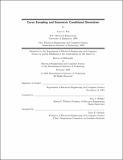Curve sampling and geometric conditional simulation
Author(s)
Fan, Ayres C. (Ayres Chee), 1978-
DownloadFull printable version (3.806Mb)
Other Contributors
Massachusetts Institute of Technology. Dept. of Electrical Engineering and Computer Science.
Advisor
Alan S. Willsky.
Terms of use
Metadata
Show full item recordAbstract
The main objective of this thesis is the development and exploitation of techniques to generate geometric samples for the purpose of image segmentation. A sampling-based approach provides a number of benefits over existing optimization-based methods such as robustness to noise and model error, characterization of segmentation uncertainty, natural handling of multi-modal distributions, and incorporation of partial segmentation information. This is important for applications which suffer from, e.g., low signal-to-noise ratio (SNR) or ill-posedness. We create a curve sampling algorithm using the Metropolis-Hastings Markov chain Monte Carlo (MCMC) framework. With this method, samples from a target distribution [pi] (which can be evaluated but not sampled from directly) are generated by creating a Markov chain whose stationary distribution is [pi] and sampling many times from a proposal distribution q. We define a proposal distribution using random Gaussian curve perturbations, and show how to ensure detailed balance and ergodicity of the chain so that iterates of the Markov chain asymptotically converge to samples from [pi]. We visualize the resulting samples using techniques such as confidence bounds and principal modes of variation and demonstrate the algorithm on examples such as prostate magnetic resonance (MR) images, brain MR images, and geological structure estimation using surface gravity observations. We generalize our basic curve sampling framework to perform conditional simulation: a portion of the solution space is specified, and the remainder is sampled conditioned on that information. For difficult segmentation problems which are currently done manually by human experts, reliable semi-automatic segmentation approaches can significantly reduce the amount of time and effort expended on a problem. We also extend our framework to 3D by creating a hybrid 2D/3D Markov chain surface model. For this approach, the nodes on the chain represent entire curves on parallel planes,and the slices combine to form a complete surface. Interaction among the curves is described by an undirected Markov chain, and we describe methods to sample from this model using both local Metropolis-Hastings methods and the embedded hidden Markov model (HMM) algorithm.
Description
Thesis (Ph. D.)--Massachusetts Institute of Technology, Dept. of Electrical Engineering and Computer Science, 2008. This electronic version was submitted by the student author. The certified thesis is available in the Institute Archives and Special Collections. Includes bibliographical references (p. 195-203).
Date issued
2008Department
Massachusetts Institute of Technology. Department of Electrical Engineering and Computer SciencePublisher
Massachusetts Institute of Technology
Keywords
Electrical Engineering and Computer Science.